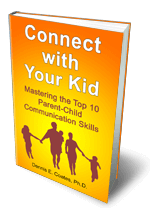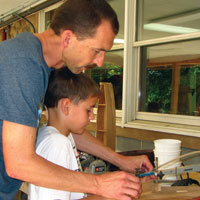Billions of human beings follow their separate paths, steps followed by steps largely unknown to the people around them – even friends and acquaintances. This limited ability to know for sure what’s happening in the lives of others in any given day — actions, reactions, thoughts, feelings, perceptions, and decisions – separates us. We may make assumptions, we may think we know others, but only the individual is aware of the whole story, the details of his own life.
A parent looks into a small child’s eyes. The truth: it is very, very hard to appreciate the reality of what it’s like to be that small child. This inability to fully understand another person’s inner world is a part of the human condition. But because of the real-time dependency of a small child on the parents, the intimacy is greater than it will ever be again. For the older kids get, the more independent they become, and the greater the separateness.
When children go to school, they’re taking the first of many steps toward building their own lives, and the natural tendency will be to grow apart. Then, when they eventually leave home, the separateness will become nearly the same as you would experience with friends and acquaintances – people you know whose private lives are mostly unknown to you.
How can we share in the lives of our growing children? How can we hold on to intimacy while helping them become independent?
Be present. Physically. Emotionally. Make contact as often as possible, trying to be aware of their journey, being there for their experiences of growing up.
Be in the present moment. While present, let go of thoughts of the past or future: judgments, memories, advice plans, and dreams. Be accepting while focusing on who they are and what they’re experiencing right now.
Feel and express empathy. Sense what your child is feeling, and why. Communicate your understanding of this.
Listen to understand. When they speak, check what you believe they’re trying to say, verbally and nonverbally.
Share stories. Ask about what has been happening. Share stories from your recent life, as well as stories about your own growing up. This is a fundamental way human beings penetrate the separateness. We share stories about each other.
None of this can happen without a conscious effort. All of it requires practice to achieve a level of skill.
You already know that being a parent is the hardest thing you’ll ever do. You already know that nurturing meaningful relationships requires a dedicated effort.
Your kids don’t have to become strangers to you. You’ll never defeat the separateness, but for the sake of love you can penetrate it briefly and often to gain small but meaningful insights into the rich world of another human being.
 More truth-telling about parent-teen communication.
More truth-telling about parent-teen communication.
My how-to book about communicating with your child: Connect with Your Kid: Mastering the Top 10 Parent-Child Communication Skills.
You can grow the bond with your child through better listening. Download the FREE ebook, Listening to Understand.

